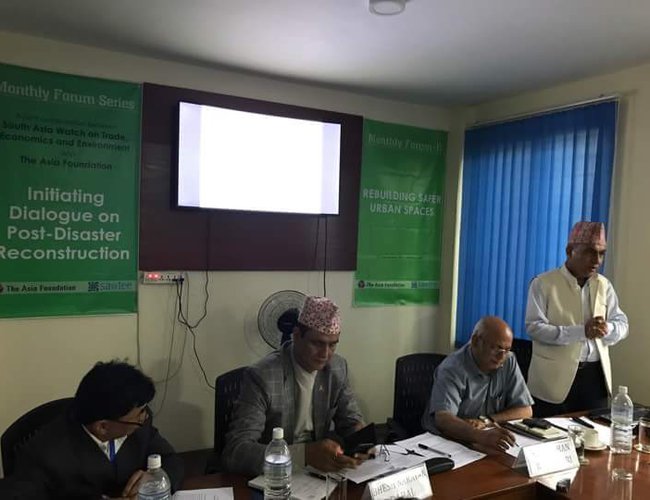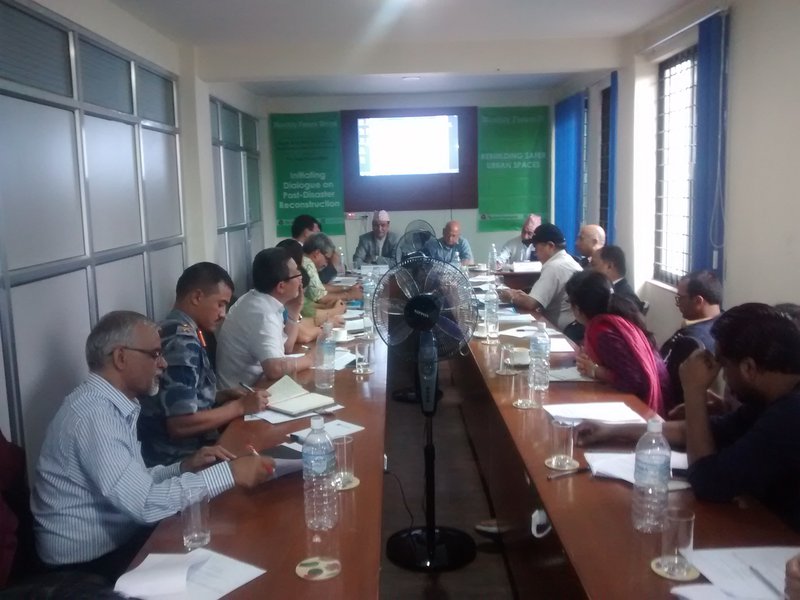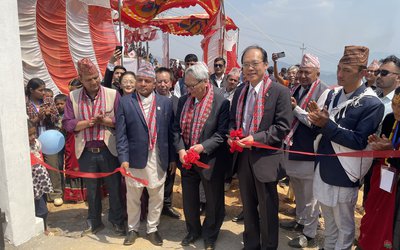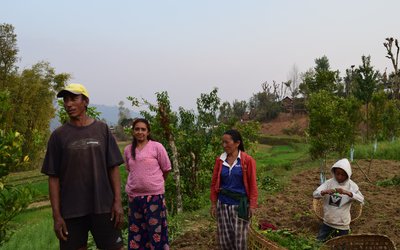
At a time when the encroachment of open space is rampant, South Asia Watch on Trade, Economics and Environment (SAWTEE) organized a discussion program on ‘Rebuilding Safer Urban Spaces’.
Under taken with support from The Asia Foundation (TAF), this is fourth such discussion forum organized by SAWTEE under the project ‘Initiating a dialogue on Post-Disaster Reconstruction Experience.
Presenting his paper on Rebuilding Safer Urban Spaces, a former secretary at the Ministry of Urban Development and expert member of the steering committee of the National Reconstruction Authority (NRA) Kishore Thapa pointed out the need of strictly enforcing Settlement Development, Urban Development and Building Construction Basic Byelaws 2072. This was one of the major changes imposed as one of the first rebuilding exercises.
He said that its success will depend on conviction of citizens that these rules are for their own benefit and capacity of the local governments for strictly implementing these regulations.
He also drew the attention towards reviewing existing housing policies, operational guidelines, and responsible agencies to ensure safer living spaces. Former secretary Thapa added that integral part of reconstruction in the urban spaces, especially in the valley, pertains to reviving cultural heritage and traditional settlements with minimum aesthetic and structural intervention. Similarly, he called attention to lack of open space that affected the initial relief and recovery works in the immediate aftermath.
Technical advisor to the National Society for Earthquake Technology (NSET) and former Director General, Department of Urban Planning and Building Reconstruction Surya Bhakta Sangachchen stressed on the stakeholder engagement —between central government, community and local level, in order to achieve harmonious and acceptable rebuilding. He cited an example of Boudhanath Stupa that involved local participation from the support of government entities. In addition, he also pointed out the possibility of house pooling to be undertaken in the core city areas in Kathmandu and Lalitpur such as Kilagal and Pilachhen, respectively, could provide a blueprint for the reconstruction.
Another speaker Bhesh Narayan Dahal, Director General, Department of Archaeology, pointed out the government efforts towards preservation and reconstruction of the cultural heritage and emphasized government’s priority towards preserving national heritage as far as possible in the reconstruction process. 
Chairing the discussion forum, Prof Dr. Sudarshan Raj Tiwari, former Dean of Institute of Engineering, said that in adopting modern technology, traditional and indigenous knowledge should not be discarded. He said that traditional and indigenous knowledge has been proved time and again after withstanding various disasters and thus emphasized on footprint conservation.
Vice-chairperson of SAWTEE, Urmila Joshi, said that best possible way forward is to integrate new technology with the traditional knowledge so that we can have best of both worlds in building safer spaces. The experts present at the program also emphasized on the need to review housing policies at an operational level in order to create a safer living space in the densely populated urban areas.
Some 30 participants from various organizations, including research institutions, experts, activists and development partners, participated in the event.
Themes such as “Nepal Post-Disaster Reconstruction Experience: Current Status and Lessons learned”, “Migration and Labor Dynamics in Post-Disaster Nepal”, and “Expenditure Analysis and Tracking of Post-Earthquake reconstruction programs” have already been covered in similar previous events.
- TANAHU HYDROPOWER PROEJCT: A Significant Achievement
- Apr 15, 2024
- AMBASSADOR HANAN GODAR: Sharing Pain With A Nepali Family
- Mar 30, 2024
- VISIT OF KfW AND EIB TO NEPAL : Mission Matters
- Mar 25, 2024
- NEPAL BRITAIN SOCIETY: Pratima Pande's Leadership
- Mar 24, 2024
- NEPAL ARMY DAY: Time To Recall Glory
- Mar 15, 2024
















